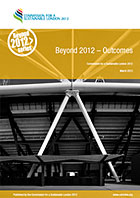We would like to clarify and make public our advice to LOCOG about carbon impacts of grid electricity supply.
During the Games, LOCOG will receive energy from a variety of sources, including; heat and cooling from the on-site permanent energy centre, renewable energy from solar photovoltaics, temporary generation from diesel generators and electricity supplied from the grid.
With respect to grid electricity, we have consulted widely with industry experts, government bodies, NGOs and with LOCOG’s own carbon Technical Advisory Group. We have advised LOCOG to draw a clear distinction between how they report new and existing low carbon supply sources, making it clear what has been commissioned for the Games, and what is existing low carbon generation. Where the Games are to be supplied from existing sources, the supplier’s other customers will be supplied with less, having no net impact on the environment.
The UK government uses a standard “grid mix” to calculate the carbon related to all existing energy generation mix and only consider new sources to be “low carbon” or “renewable”. Given this assumption and the strong message from our stakeholders, we have advised LOCOG to report their carbon emissions based on the UK government grid mix, unless the supplier can demonstrate “additionality” using a certified methodology. We are pleased to confirm that LOCOG has accepted our advice.
We note that energy and sustainability partner EDF has been making various claims about low carbon energy supply and their association with the Games. We have included below, as an example, a verbatim quote and clip from a TV advertisement from early 2011:
“..need to do all we can to make the next Games as low carbon as possible. That’s why every unit of electricity that EDF Energy supplies to London 2012 during the Games will be matched with power generated from low carbon sources. EDF Energy – powering the London 2012 Games.”

Owners of some other venues that will be used for the Games also have green tariff arrangements in place.
We recognise these initiatives stimulate demand for renewable energy and create more clarity around carbon accounting in the longer term but they will not contribute to LOCOG’s carbon objectives.
We are pleased to note from the London 2012 Sustainability Report (April 2011) that LOCOG has based its carbon footprint estimates for Games-time venue energy use on the current grid average figures.
We look forward to monitoring LOCOG’s ambitious plans to deliver a low carbon Games through energy conservation.
